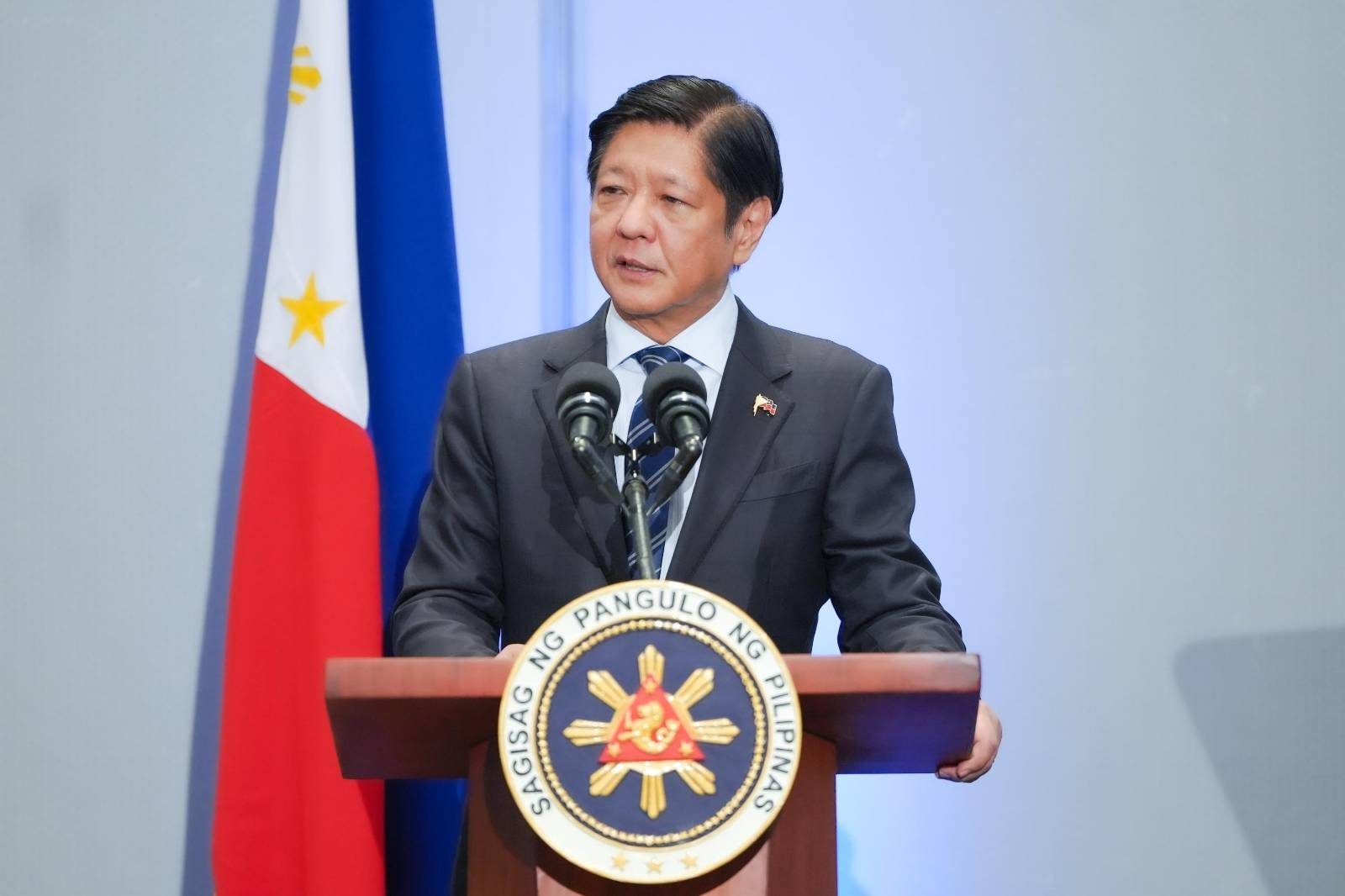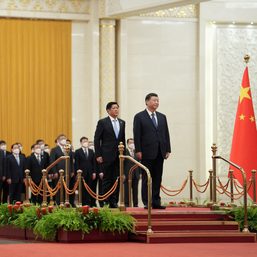SUMMARY
This is AI generated summarization, which may have errors. For context, always refer to the full article.

MANILA, Philippines – President Ferdinand Marcos Jr. hopes to “strengthen the cooperation” between the Philippines, United States, and Japan as China amps up its rhetoric against Manila over the South China Sea.
“We hope the intention is to continue to plan, to strengthen the cooperation between the three countries—the United States, Japan, and the Philippines. And we will perhaps formalize it but we, at this point, we are still…that’s part of the discussion that we will be having to exactly what will be put in any agreement,” Marcos told Philippine media in response to questions in Berlin, Germany, on Wednesday, March 13 (early March 14 in Manila).
The Philippine President might be visiting Washington DC in April, to joint a trilateral meeting with US President Joe Biden and Japanese Prime Minister Kishida Fumio. The US-Japan Summit is expected to happen in April 2024, too.
“It is probably just formalizing what we are already doing, which will put a bit more structure to what we will do as a – interoperability and the actual joint cruises that we are having. So, that is still in flux so we have to talk about it some more. Let’s wait for the developments that will come from DC, from Tokyo, and here in Manila,” added Marcos.
This would be the first time for the three leaders to meet with each other at the same time. Marcos had first met Kishida and Biden separately back in September 2022, on the sidelines of the United Nations General Assembly (UNGA) in New York City.
A trilateral meeting between the US, Japan, and the Philippines has happened before – although it was US Vice President Kamala Harris who represented the US. Marcos, Kishida, and Harris had met informally on the sidelines of the Association of Southeast Asian Nations summit in Jakarta in September 2022. The foreign ministers of the three countries had also met in September 2023, on the sidelines of the UNGA.
The trilateral relationship of the three countries is something observers, diplomats, and interlocutors – including those in Beijing – are keeping close tabs on.
Both Japan and the Philippines are US treaty-allies. The Philippines, independent of the growing trilateral relationship with two countries, has existing deep ties with Japan. Manila and Tokyo hope to sign by the end of March 2024 a Reciprocal Access Agreement, a deal similar to the Philippines’ Visiting Forces Agreement with the US. The agreement would allow Japanese defense forces on Philippine soil.
Signing the RAA would make it easier for Japan to participate in military training exercises in the Philippines, whether it’s bilateral or multilateral.
The Marcos administration has given particular attention to strengthening and developing defense and security ties with both old and new allies or partners.
In contrast to his predecessor, Rodrigo Duterte, Marcos has brought Manila back closer to Washington DC – much to China’s chagrin.
US Secretary of State Antony Blinken is set to visit Manila from March 18 to 19, which is expected to focus on trade and investment relations.
Beijing’s lines
On Friday, March 15, China’s Defense Spokesperson Senior Colonel Zhang Xiaogang berated the Philippines, urging its Asian neighbor “not to further walk down the wrong path, and immediately stop any provocative actions that may escalate the disputes or complicate the situation,” referring to incidents in the South China Sea.
“At the same time, we suggest that some non-regional countries stop their rhetoric and actions that embolden and support the provocative and risky acts of the Philippines and refrain from being a disruptor in the South China Sea,” said the Chinese spokesperson.
Zhang’s assertions – including three points summarized by China’s military in a news release on March 15, are nothing new.
Beijing has accused Manila of infringing on its rights in the South China Sea, even in features that are within the Philippines’ exclusive economic zone, where it is entitled sovereign rights.
China has also repeatedly accused the Philippines of breaking so-called promises, amplified most recently through claims made by an anonymous Chinese officials to Philippine media.
The Philippines’ Department of Foreign Affairs (DFA), in turn, fumed over China’s disclosure of “sensitive” bilateral discussions.
“Under the guise of supplying daily necessities, the Philippine side not only delivered construction materials to the grounded vessel, but also arranged journalists on board the supply boats to stage photos,” said Zhang.
Journalists joining supply missions – on board Philippine Coast Guard ships, and not the supply boats themselves – is part of the government’s “transparency initiative” aimed at exposing China’s actions in the West Philippine Sea.
Both independent and state-funded media routinely join missions to document China’s harassment out at sea. Beijing has bristled over embedded media during these missions.
“Recently a few Philippine military officials even made shows and played victim, trying to deceive both themselves as well as others. But no matter how they perform, nobody will buy their story,” added Zhang.
He was, most likely, referring to a December 2023 mission that Philippines military chief General Romeo Brawner Jr. and Western Command chief Vice Admiral Alberto Carlos joined. Carlos was also on board the Unaizah May 4, a supply ship damaged by the China Coast Guard’s water cannoning during a March resupply mission.
Participation of top military generals in these missions are not announced publicly until after the mission is completed.
While the long-term effects of the Philippines’ transparency initiative are yet unclear, experts and even diplomats themselves will point to its immediate gains: allies of the Philippines are quick to express support if incidents happen.
The list of countries who support the 2016 arbitral award, which deemed China’s sweeping claim of the South China Sea, invalid, has also slowly been growing since the Marcos administration took a stronger stance on the West Philippine Sea. – Rappler.com
Add a comment
How does this make you feel?











![[Just Saying] SONA 2024: Some disturbing points](https://www.rappler.com/tachyon/2024/07/TL-marcos-sona-points-july-23-2024.jpg?resize=257%2C257&crop=335px%2C0px%2C720px%2C720px)

There are no comments yet. Add your comment to start the conversation.